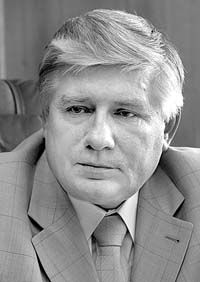One of the government’s immediate goals is not so much to confiscate illegally acquired property as to send a message to business circles that this will not be a mass-scale process. Last Tuesday President Yushchenko took a step in this direction, disavowing Prime Minister Yuliya Tymoshenko’s statement in Brussels that 3,000 businesses may be re-privatized by the courts, which made foreign investors as well as this country’s entrepreneurs feel very uneasy. “When we talk about Ukrainian privatization today, the prime minister and the president are taking the same stand, namely: the revision of privatization will concern a few dozen facilities, where national laws were grossly breached,” President Yushchenko said. “This will affect several dozen businesses. Dozens, not hundreds or thousands.” The president announced that a final list of these businesses is being compiled. Incidentally, this list will be final, so that “no one will be tempted to expand it. Neither the cabinet nor the president were intending to pursue this kind of policy,” said the president, correcting the premier’s blunder.
Did the president manage to convince foreign investors? Not all of them, it seems. As US Ambassador to Ukraine John Herbst said last Wednesday, when he was addressing Alpha Bank’s investment forum in Kyiv, “there are things that the government should do and things that it should not do.” The ambassador recalled high-level government statements about the possible revision of privatization results-”not even a revision but a re-nationalization” of 3,000 businesses, and emphasized that this is unacceptable for the flow of direct investments to this country.
Another signal in this direction that business is looking forward to is the reinstatement of the State Property Fund (SPF) and the lifting of the temporary ban on privatization. In all likelihood, the “question” was heeded because last Tuesday Mykhailo Chechetov announced that the SPF may resume its full activities this week or the next in such sectors as leasing, privatization of small businesses, and management functions. As for strategic enterprises, Mr. Chechetov said that sales of these businesses would only be resumed after the adoption of a new state program of privatization to which a list of such enterprises will be attached.
For the time being, the SPF has been instructed to draft a governmental program called “The People’s Property” that will set out the basic principles of privatizing, managing and leasing state property and public utilities. But, according to Mr. Chechetov, since the government has decided to increase its control over the state’s corporate rights, the SPF is going to relegate privatization matters to the background. The fund is now actively drafting a law on state property management, which will be the top-priority direction of its activities from now on. While the face value of all state-owned shares is UAH 26.12 billion, budget revenues resulting from this ownership are too small. To improve the management of state corporate rights, the SPF is going to increase the number of relevant departments from two to seven. In particular, the fund will now have departments of leasing, joint ventures, international property relations, and foreign-based property. The fund is also working on compiling a register of state property and is planning one for communal property in the nearest future. What is important here is the support of local authorities. Accordingly, the SPF is drafting a law that will oblige the latter to furnish the required information.







